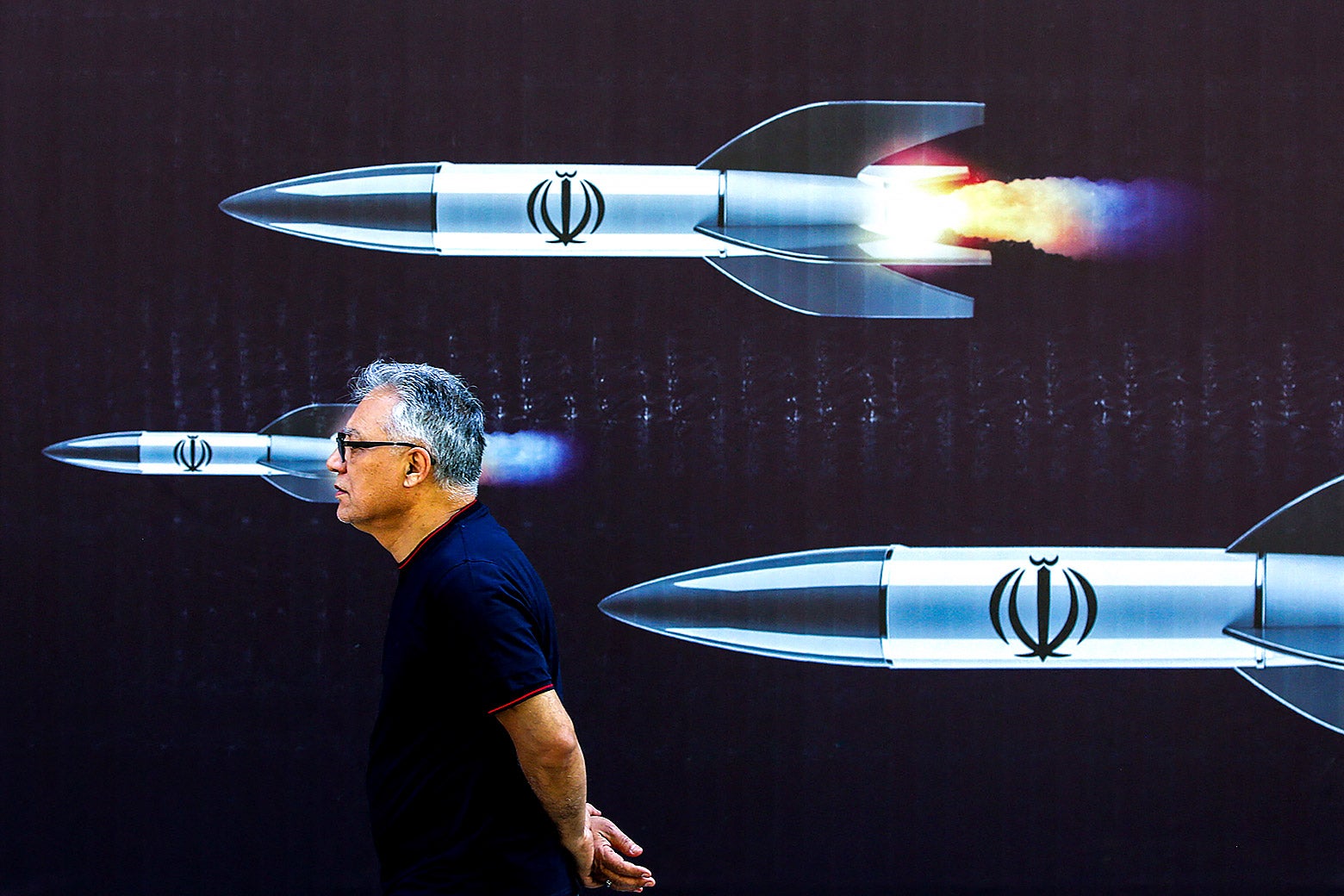A rare bit of calming news from the Middle East: It seems that neither Israel nor Iran wants to widen the war.
The odds of a direct conflict between the region’s two most powerful countries seemed high for much of this month. On April 1, Israel attacked Iran’s consulate in Syria, killing seven senior officers of the Islamic Revolutionary Guard Corps. On April 13, Iran retaliated by launching a massive, multipronged attack—more than 300 missiles and drones, including 110 ballistic missiles—against Israel. Almost all the incoming weapons were shot down (a remarkable feat by U.S., Israeli, British, French, and Jordanian air defenses), no one was killed, and very little damage was sustained, and at just one air base. Still, the attack, which could have been deadly, marked the first time Iran had ever attacked Israeli territory. Israel felt the need to do something in response.
In the wee hours on Friday, three drones flew over an air base in the Isfahan district of southern Iran, not very far from a critical nuclear facility. Iran says they were all shot down. Maybe so, maybe not. The key facts are these: Israel has not acknowledged launching the drones—nor has Iran accused Israel of doing so. In fact, one senior Iranian official blamed the deed on “infiltrators” who fired the drones from inside Iran.
The point is, the widespread fears of mutual escalation—one airstrike sparking another, which sparks another, then another, on and on, for reasons of revenge, pride, a compulsion to “restore deterrence,” or whatever—have proved baseless, at least for now.
After the Saturday night air raid, an Iranian official warned Israel not to retaliate. Even a small Israeli attack, he said, would trigger a much more massive counterstrike from Tehran. President Biden urged Israeli Prime Minister Benjamin Netanyahu to heed the warning. Most Israelis felt they had to do something to deter future Iranian attacks. They wound up doing about as little as a powerfully armed country can do while still doing something—and Iran pretended that Israel didn’t launch the attack anyway, thus evading their pledge to respond to any such attack massively.
In sum, Iran proved that it can mount a massive attack on Israel, while Israel proved that its weapons have the range to strike targets inside Iran. That seemed to be enough for both sides. The equilibrium has thus been restored, at least for now.
As of midday Friday, the Israeli government seemed content to go along with the game, declining to comment on the drone strike. An exception was Itamar Ben-Gvir, the ultra-right-wing national security minister, who had pushed for a much more forceful response. “Lame!” he tweeted Friday morning in reference to the three-drone airstrike—thus acknowledging that Israel had launched the attack and that some senior officials wanted to do more. Netanyahu usually endorses Ben-Gvir’s radically hawkish statements, or at least doesn’t dispute them. But this time, Channel 12, Israel’s leading TV news station, reported that officials in the prime minister’s inner circle are very upset with the tweet, saying that it damaged Israel’s national security and slamming Ben-Gvir generally as “childish” and “irrelevant to any discussion.”
Meanwhile, the aftereffects of Iran’s attack last weekend continue to benefit Israel. On Wednesday, 48 countries signed a statement condemning Iran for its attack on Israel. The palpable sign of Israel’s continued vulnerability is also likely to boost approval of President Biden’s emergency military-aid package, which the House will take up on Saturday. Before the attack, many of those countries would have been reluctant to endorse any expression of support for Israel—and Biden’s aid package was losing support—as a result of Israel’s “over-the-top” military tactics (as even Biden called them) in Gaza.
The prospect of a major war between Iran and Israel distracted the world’s focus from the fighting and suffering in Gaza, but probably not for long. U.S. and Israeli officials remain locked in disagreement over how to rout the last battalion of Hamas terrorists from the town of Rafah on Gaza’s southern tip, where more than 1 million civilians—most of them refugees from the northern towns—are crowded, many of them starving. Netanyahu and the other members of his war Cabinet want to mount a major offensive against Rafah. Biden and his aides urge them not to take that step unless they come up with a way to avoid killing tens of thousands of the civilians. The Israelis have not come up with any such way. Nor have the Americans thought up a way to rout Hamas’ last battalion without an armed offensive.
This is why U.S., Egyptian, and Qatari diplomats continue to hammer out a plan for a cease-fire, combined with an exchange of Israeli hostages held by Hamas for Palestinian prisoners held by Israel. Hamas has rejected several proposals, most of them endorsed by Israel. Its one counteroffer—a cease-fire that delays the release of any hostages until all Israeli troops have withdrawn from Gaza—is unacceptable to Israel.
Meanwhile, U.S. and Saudi officials have revived the idea, first discussed nine months ago, of a grand bargain in which the U.S. provides security guarantees to Saudi Arabia, the Saudis establish formal diplomatic relations with Israel, and Israel takes the first steps toward recognizing a Palestinian state, preferably a demilitarized one with a new Palestinian Authority. The Saudis have since relaxed the final condition to a verbal declaration by Israel that it will simply renew talks about a two-state solution to the long-festering “Palestinian problem.” However, Netanyahu is leery even of paying lip service to the idea—partly because he is against it, partly because even doing that much would alienate the far-right members of his governing coalition. If just five members resign as a result, new elections would be called, and polls indicate he would lose.
This is the state of things: Every party with an interest in the region wants this grand deal—cease-fire, hostage exchange, and talks toward a Palestinian state—except for Israel and Hamas, the war’s two combatants. Little progress is likely to happen without pressure on them from outside powers—the U.S. on Israel, Qatar on Hamas. The current, transitory relaxation of tensions between Israel and Iran, as well as revived talks about a Saudi grand bargain, creates some breathing room for the diplomats. Will any of it matter? That’s the question.

Abhinav Thawait is a globe-trotting correspondent with a passion for international affairs. With a background in international relations, he offers a global perspective on the most pressing issues around the world. Abhinav’s curiosity takes his to the far corners of the earth, where he seeks to share untold stories and diverse viewpoints.








